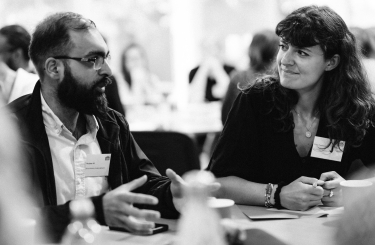Related

As we continue our learning series on Place, James Goodman, Associate Director at London Funders, reflects on what we’re learning from bringing funders together locally through our place based forums
As work schedules start to fill up following the summer break, it feels like life is getting busier and busier. With growing to-do lists and deadlines, it can feel like there are ever fewer opportunities for people to step back, share plans and reflect together on what is challenging and what is hopeful. That is why London Funders’ local funder forums are so important. There are now forums covering thirteen boroughs across the capital, each instigated by local funders. Some have been going strong for some time now, others - like Ealing or Hammersmith and Fulham - have just kicked off in the past year.
They all have a goal of holding space for any organisation that is actively funding in the borough to connect, build relationships, share plans, concerns, insights and hopes, and create the potential for collaboration. London Funders convenes these spaces and provides the secretariat, but the forums are shaped and driven by the funders themselves. Earlier in the year, I joined the London Funders team to bring additional capacity to these forums, and after six months of chairing the meetings, it feels like a good time to reflect on what has emerged so far this year.
Each meeting takes a different shape. Sometimes the agenda is open and exploratory; at other times, discussions centre on pressing local issues. In Southwark, funders have been examining the role and future of participatory grant-giving, building on several years of experimentation with these approaches. In Kensington and Chelsea, recent conversations have turned to serious youth violence, with funders asking whether a more coordinated and systemic response might be possible - and what it could look like in practice. Meanwhile, in Lambeth, the focus has been on the imminent redevelopment of International House, a council-owned hub for VCSE organisations since 2018, and the wider implications for civil society space in the borough.
Conversations are all the more immediately practical and relevant because, being place-based, they are rooted in context and history. They build up a collective understanding of what is happening in that place, help align plans and strategies, and ultimately contribute to a more effective funding ecosystem. These are important spaces for locally-focused organisations but also for those with a regional or national focus (40% of our members have a national focus, and a further 20% work regionally), to gain a sense of what is happening on the ground.
Despite the diversity of boroughs, some common themes have emerged across the local funder forum discussions. One is space. The closure of International House in Lambeth highlights wider concerns about the cost and availability of places where civil society groups can work and collaborate. Rents, running costs and refurbishment costs are rising, while supply is shrinking and demand is growing. Good-quality spaces are hard to find, and specialist spaces - for example, with kitchens - even more so. Funder forums have been discussing how to address this, not just through investment but through better coordination and brokerage of available space.
Another recurring theme has been the needs of small, informal, often unincorporated groups. When funders in Newham met recently, they noted that the pandemic and cost-of-living crisis spurred many residents to step forward and help their communities, creating a wave of new grassroots activity, some of whom are now looking to shift from informal voluntary start-ups to incorporated organisations.
This brings opportunities as well as challenges. Resident-led groups have deep local knowledge, strong networks and the ability to act quickly, but they are also fragile—often run by one or two volunteers navigating an already stretched funding landscape. The question for funders is, how can the energy and drive of emerging groups best be supported? That might mean training and fundraising support, as well as investment to help make the jump from short-term micro-grants into something more sustainable. But participants also felt something was missing in this response, and asked what other approaches are needed, ones that can harness the agility and connectedness of grassroots resident-led activity without expecting it to fit the existing system, something we’ll be exploring in future sessions.
Without doubt, the strongest common theme over the past year of funder forums has been - perhaps not surprisingly - the increasing sense of brittleness and fragility across the sector. Demand for funding is soaring, while the availability of funds has increased only slightly and in some areas is reducing quite significantly. Funders are taking this seriously and responding in a wide range of ways, as London Funders’ insight report from earlier in the year describes. This dynamic is driving a number of other conversations in the local funder forums, such as:
Meetings have surfaced many other themes, all from a place-based perspective. These include best practice in community engagement, the continuing importance of equity and justice infrastructure, systems change, best practice in grant design and the sudden ubiquity of AI, to name just a few. Funders share their reflections on grants they are making, their plans for the future, ask and answer questions and seek and offer support.
As the next round of meetings begins this Autumn, we’ll revisit these issues and look ahead to what’s on the horizon. These semi-structured, informal spaces are invaluable - places where connections form and conversations venture into unexpected, sometimes challenging territory. They are an important element of the soft infrastructure that keeps the funding ecosystem going, and a potential growth point for the future funding ecosystem that we need.
James Goodman is Associate Director at London Funders. If you’d like to join one of our local funder forums, check out the latest dates and email us to join the mailing list. They are open to any funder who is actively funding or who is looking to invest in the borough.
